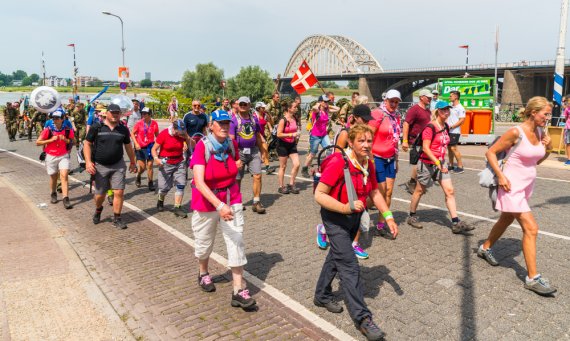© Shutterstock
About 1.5 million Dutch people use Statin, a medicine that is prescribed as cholesterol-reducing medication. ‘An important side-effect is people experiencing muscle problems, such as stiffness and muscle ache’, says Maria Hopman, physician-physiologist at Radboudumc and associated with WUR one day a week. ‘Some people stop taking the medicine following these problems.’ Something that is undesirable considering the risks of high cholesterol levels.
Muscle damage
The researchers suspect these muscle problems are caused by the statins inhibiting the mitochondria – the powerhouses of the cells. To test this, they are comparing two groups of hikers who take cholesterol-reducing medication; one group of thirty-five hikers has muscle problems, while the other group does not. The control group consists of people who do not take any cholesterol-reducing medication. Hopman: ‘The great thing about the Vierdaagse is that you can study a large group of people who are making a huge physical effort. That way, we can itemise the effects of heavy effort and cholesterol-reducing medication on muscles.’
Dehydration
The scientists collect blood, urine, oral mucosa and more from the participants. ‘We can use these to study various aspects, such as the extent of muscle damage and how well the mitochondria work’, Hopman explains. The researchers also measure the level of Q10 in the blood. This substance, which is available as a food supplement, is supposed to counteract the effects of statin and thus help decrease muscle problems. However, little is known about these effects. Through this study, the researchers hope to gain new insights into what statin does exactly and the possible advantageous effects of Q10 supplements.
To perform the measurement, a temporary lab was set up in a school near the start of the Vierdaagse. Hopman: ‘Today is exceptionally hot, so I expect we might see some dehydrated people by the end of the day. This is something we need to consider in the measurements, as it causes the values measured to be higher.’
The researcher is part of a long-term research project into the effects of an active lifestyle on one’s health, quality of life, disease progression and experience of disease. ‘We have been conducting research during every Vierdaagse since 2007, with a different theme each time.’ The results of this study are expected to be published next year.
Additional reading (partly in Dutch):
Onderzoek naar oudste deelnemers Vierdaagse (video)
Hundred oldest people at Vierdaagse monitored by researchers
Hoge uitval ouderen bij onderzoek Vierdaagse

